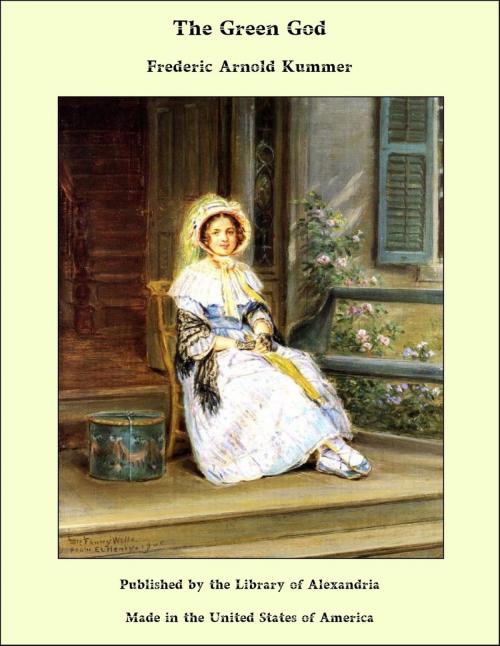| Author: | Frederic Arnold Kummer | ISBN: | 9781465605542 |
| Publisher: | Library of Alexandria | Publication: | March 8, 2015 |
| Imprint: | Language: | English |
| Author: | Frederic Arnold Kummer |
| ISBN: | 9781465605542 |
| Publisher: | Library of Alexandria |
| Publication: | March 8, 2015 |
| Imprint: | |
| Language: | English |
Break it in, cried Major Temple; "break it in at once." At his words, one of the servants and myself threw our combined weight against the door, and after several attempts, the fastening gave way, and we were precipitated headlong into the room. It was dark, and it seemed to me that the air was heavy and lifeless. We drew back into the hall as one of the servants came running up with a candle, and Major Temple, taking it, advanced into the room, closely followed by myself. At first our eyes did not take in the scene revealed by the flickering candlelight, but in a few moments the gruesome sight before us caused both Major Temple and myself to recoil sharply toward the doorway. Upon the floor lay Robert Ashton in his nightclothes, his head in a pool of blood, his hands outstretched before him, his face ghastly with terror. The Major at once ordered the servants to keep out of the room, then turned to his daughter and in a low voice requested her to retire. She did so at once, in a state of terrible excitement. He then closed the door behind us, and, after lighting the gas, we proceeded to examine the body. Ashton was dead, although death had apparently occurred but a short time before as his body was still warm. In the top of his head was found a deep circular wound, apparently made by some heavy, sharp-pointed instrument, but there were no other marks of violence, no other wounds of any sort upon the body. I examined the wound in the head carefully, but could not imagine any weapon which would have left such a mark. And then the wonder of the situation began to dawn upon me. The room contained, besides the door by which we had entered, three windows, two facing to the south and one to the west. All three were tightly closed and securely fastened with heavy bolts on the inside. There was absolutely no other means of entrance to the room whatever, except the door which we had broken open and a rapid examination of this showed me that it had been bolted upon the inside, and the catch into which the bolt slid upon the door-jamb had been torn from its fastenings by the effort we had used in forcing it open. I turned to Major Temple in amazement, and found that he was engaged in systematically searching Mr. Ashton's gladstone bag, which lay upon a chair near the bed. He examined each article in detail, heedless of the grim and silent figure upon the floor beside him, and, when he had concluded, bent over the prostrate form of the dead man and began a hurried search of his person and the surrounding floor. I observed him in astonishment. "The police must never find it," I heard him mutter; "the police must never find it." He rose to his feet with an exclamation of disappointment. "Where can it be?" he muttered, half to himself, apparently forgetful of my presence. He looked about the room and then with a sudden cry dashed at a table near the window. I followed his movements and saw upon the table the small, green leather case from which Ashton had produced the emerald at dinner the night before. Major Temple took up the case with a sigh of relief, and hastily opened it, then dashed it to the floor with an oath. The case was empty.
Break it in, cried Major Temple; "break it in at once." At his words, one of the servants and myself threw our combined weight against the door, and after several attempts, the fastening gave way, and we were precipitated headlong into the room. It was dark, and it seemed to me that the air was heavy and lifeless. We drew back into the hall as one of the servants came running up with a candle, and Major Temple, taking it, advanced into the room, closely followed by myself. At first our eyes did not take in the scene revealed by the flickering candlelight, but in a few moments the gruesome sight before us caused both Major Temple and myself to recoil sharply toward the doorway. Upon the floor lay Robert Ashton in his nightclothes, his head in a pool of blood, his hands outstretched before him, his face ghastly with terror. The Major at once ordered the servants to keep out of the room, then turned to his daughter and in a low voice requested her to retire. She did so at once, in a state of terrible excitement. He then closed the door behind us, and, after lighting the gas, we proceeded to examine the body. Ashton was dead, although death had apparently occurred but a short time before as his body was still warm. In the top of his head was found a deep circular wound, apparently made by some heavy, sharp-pointed instrument, but there were no other marks of violence, no other wounds of any sort upon the body. I examined the wound in the head carefully, but could not imagine any weapon which would have left such a mark. And then the wonder of the situation began to dawn upon me. The room contained, besides the door by which we had entered, three windows, two facing to the south and one to the west. All three were tightly closed and securely fastened with heavy bolts on the inside. There was absolutely no other means of entrance to the room whatever, except the door which we had broken open and a rapid examination of this showed me that it had been bolted upon the inside, and the catch into which the bolt slid upon the door-jamb had been torn from its fastenings by the effort we had used in forcing it open. I turned to Major Temple in amazement, and found that he was engaged in systematically searching Mr. Ashton's gladstone bag, which lay upon a chair near the bed. He examined each article in detail, heedless of the grim and silent figure upon the floor beside him, and, when he had concluded, bent over the prostrate form of the dead man and began a hurried search of his person and the surrounding floor. I observed him in astonishment. "The police must never find it," I heard him mutter; "the police must never find it." He rose to his feet with an exclamation of disappointment. "Where can it be?" he muttered, half to himself, apparently forgetful of my presence. He looked about the room and then with a sudden cry dashed at a table near the window. I followed his movements and saw upon the table the small, green leather case from which Ashton had produced the emerald at dinner the night before. Major Temple took up the case with a sigh of relief, and hastily opened it, then dashed it to the floor with an oath. The case was empty.















